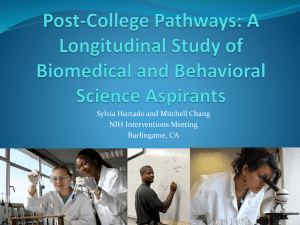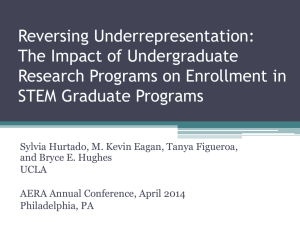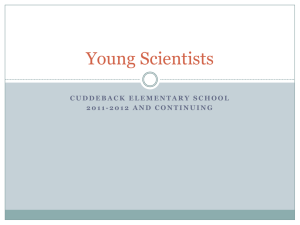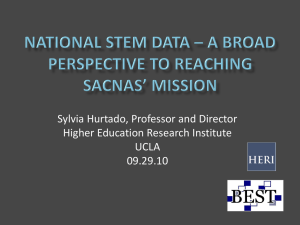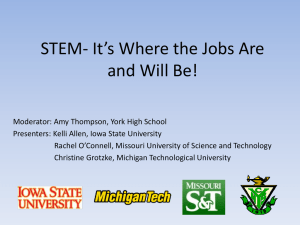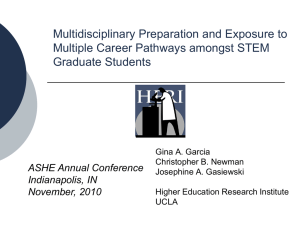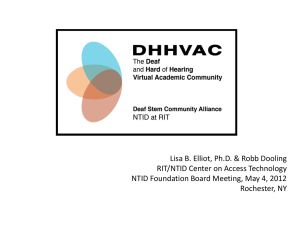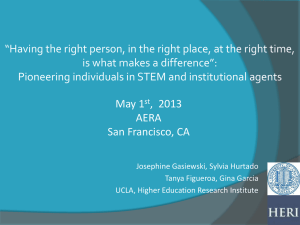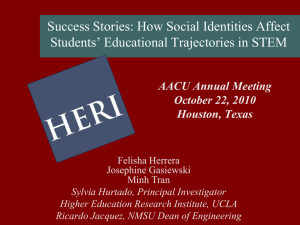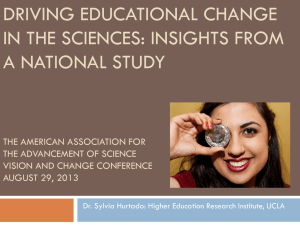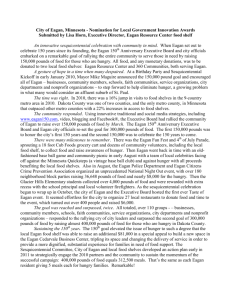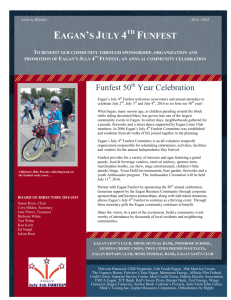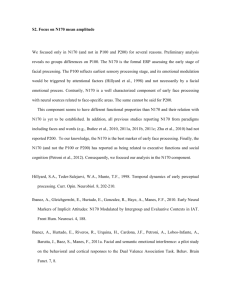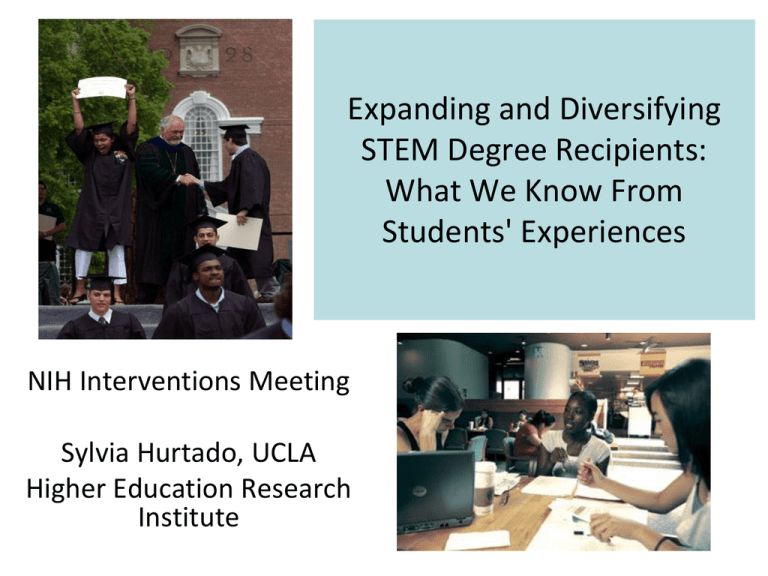
Expanding and Diversifying
STEM Degree Recipients:
What We Know From
Students' Experiences
NIH Interventions Meeting
Sylvia Hurtado, UCLA
Higher Education Research
Institute
Key Activities
• Collected six-year degree data from the National
Student Clearinghouse
• Conducted focus groups with students enrolled in
introductory STEM courses at eight campuses
• Interviewed faculty who teach introductory STEM
courses at eight campuses
• Launched the 2011 Post-Baccalaureate Survey to
more than 50,000 participants across more than 400
undergraduate “home” institutions
• Analyzed existing data and disseminated findings
Project Map
Longitudinal Surveys
Data Points
• 2004 Freshman Survey
– 420,000 students, 720
institutions
• 2005 Your First College Year
Survey
•
•
– 5,100 longitudinal student
respondents, 160 institutions
• 2008 College Senior Survey
– 6,224 longitudinal (TFS) student
respondents, 240 institutions
•
• 2008 Faculty Survey
– 6,800 STEM faculty respondents,
206 institutions
• 2011 Post-Baccalaureate Survey
– Currently 10,600 longitudinal
(TFS) student respondents, 498
institutions
•
Key Findings
Importance of UG research
programs on graduate
enrollment intentions
Structure of opportunity in
predicting students’ participation
in UG research and STEM
completion
Predictive power of science
identity and negative racial
experiences on 1st-year science
major persistence
Role of student achievement
and feelings of intimidation on
receipt of faculty mentorship
Graduate Student Focus Groups
• Conducted focus groups on six campuses with 150
graduate students
– Predominantly in STEM programs
– Recruited from programs such as AGEP
• Key Themes:
– Multiple career pathways – faculty’s willingness to expose them
to alternative careers and support them in non-research careers
– Intersections of identity – how students’ science identity
appears in conflict with identities of gender, race, religion,
sexual orientation, nationality, and socioeconomic status
– Perceptions of institutional support – the role of institutional
agents in supporting STEM graduate students
ARRA Project Map
ARRA Data Collection
and Findings
Data
• Pre/post student surveys
– 3,205 longitudinal responses
across 77 classrooms in 15
institutions
• Faculty survey
– 77 respondents across 15
institutions
• Student focus groups
– 241 participants across 8
institutions
• Faculty interviews
– 41 participants across 8
institutions
Key Findings
• Grades do not correlate with
gains students make in
scientific dispositions
• Resourcefulness positively
predicts students’ level of
engagement in introductory
STEM courses
• Students respond more
positively to Q&A sessions and
group work than they do to
lectures
Planned Data Collection and Studies
• Data Collection
– Summer 2011: Post-Baccalaureate Survey
– Fall 2011: Follow-up survey of introductory STEM
classrooms
• Studies
– BBS/STEM degree completion with institutional Best
Practices data
– Graduate school enrollment
– Alternative ways of learning in introductory STEM courses
– Culminating book for the project
Challenges & Lessons Learned
• Challenges
– Response rates
– Mountains of data
• Lessons learned/action taken
– Increased incentives for classroom survey in spring of 2010
– Maintained contact with longitudinal study participants
– Strong team of graduate students, postdocs, and PIs to make sense of
all of the data
Academic Papers and Reports: 2010-2011
•
Gasiewski, J.A., Eagan, M.K., Garcia, G.A., Hurtado, S., & Chang, M.J. (under
review). From gatekeeping to engagement: A multicontextual, mixed method study
of student academic engagement in introductory STEM courses? Research in
Higher Education.
•
Chang, M.J., Eagan, M.K., Lin, M.L., & Hurtado, S. (in press). First-Year persistence
of racial minorities in the biological and behavioral sciences: Implications for
stereotype threat. Journal of Higher Education.
•
Hurtado, S., Eagan, M.K., Tran, M., Newman, C., Chang, M.,J & Velasco, P. (in
press).“We do science here”: Underrepresented students’ interactions with faculty in
different college contexts. Journal of Social Issues, 67(3).
•
Eagan, M.K., Sharkness, J.A., Hurtado, S., Mosqueda, C., & Chang, M.J. (2011).
Engaging undergraduates in science research: Not just about faculty willingness.
Research in Higher Education, 52(2), 151-177.
•
Espinosa, L. (2011). Pipelines and Pathways: Women of Color in Undergraduate
STEM Majors and the College Experiences That Contribute to Persistence. Harvard
Educational Review, 81 (2), 209-241.
Resources & Project Staff
• Papers and reports are
available for download from
project website
RESEARCH STAFF
Sylvia Hurtado, Co-PI
Mitch Chang, Co-PI
• Project email:
herinih@ucla.edu
Postdoctoral Scholars
Kevin Eagan
Josephine Gasiewski
• Project web site:
www.heri.ucla.edu/nih
Graduate Assistants
Tanya Figueroa
Gina Garcia
Juan Garibay
Felisha Herrera
Cynthia Mosqueda
Christopher Newman
Minh Tran

